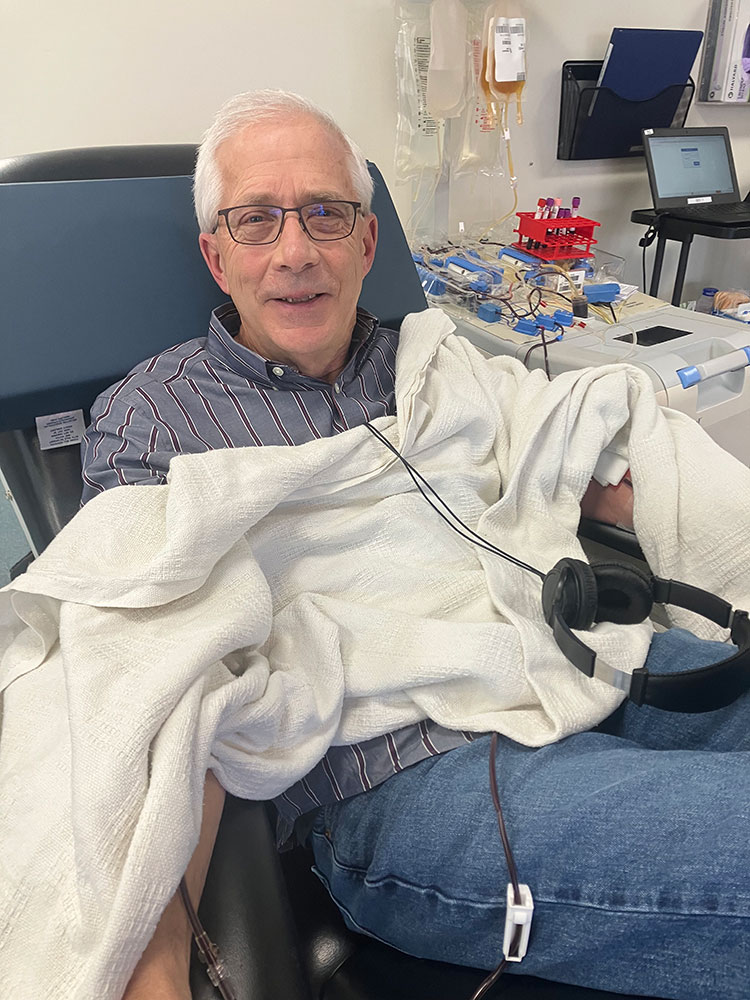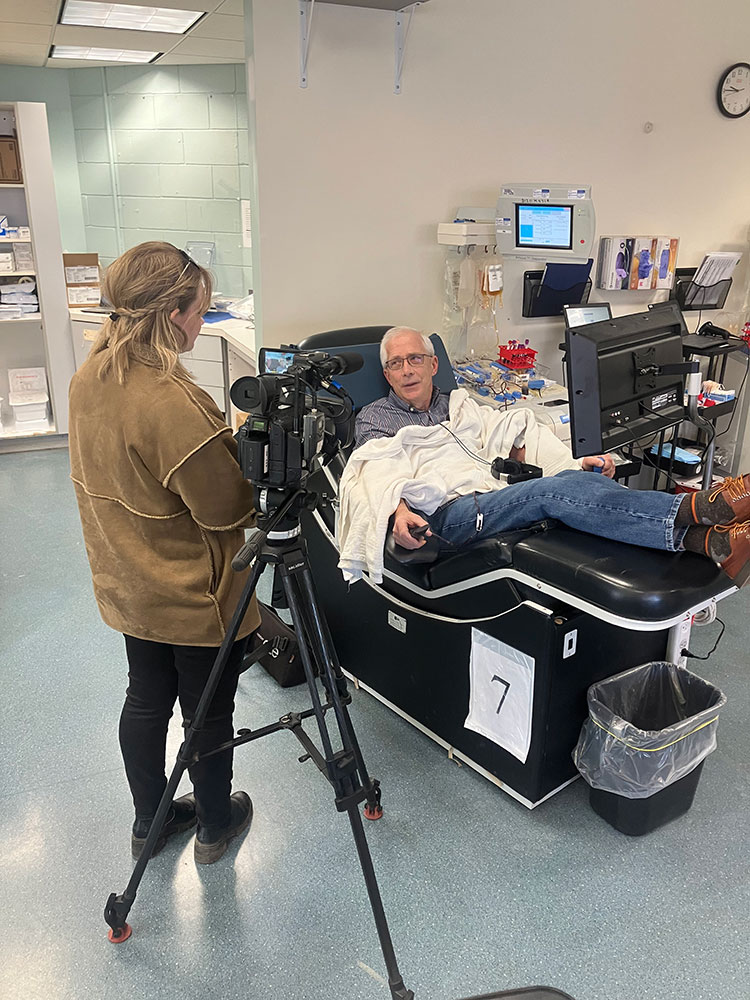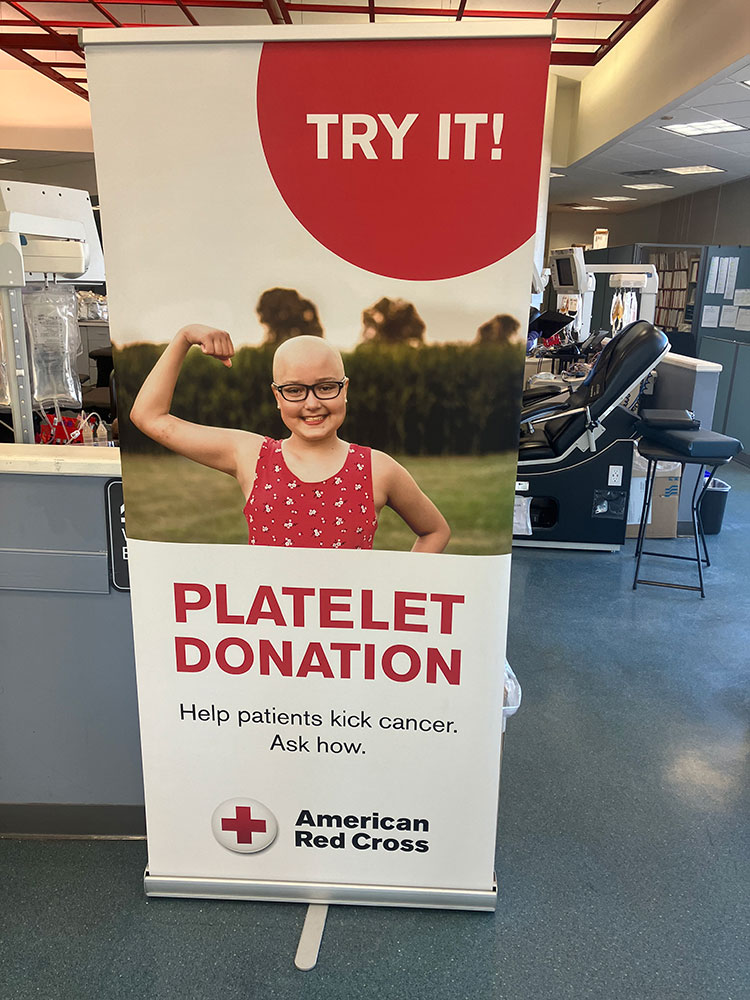
by Peter de Paolo, Red Cross communications volunteer
As Brad Eldred sees it, it’s very simple, “You realize the need is there, and you just do it.” And that explains this native Vermonter’s amazing record of platelet donation with the American Red Cross. “My personal goal is 1,000 donations,” Brad says. “Don’t know if I’ll hit it, but I’ll be well over 700 this year.”
Born in Waterbury, Brad got his degree in wildlife biology from UVM and went on to a successful career as an environmental scientist. Now retired, he lives with his wife, Nancy, in Underhill. About every two weeks, he heads to Burlington to the Vermont Red Cross Donation Center to make another critically needed platelet donation.
Most people, even if they have never donated blood, can conjure an image of the typical scenario, the donor reclining, a tube leading from their arm to a pint bag hanging from a hook. This type of “whole blood” donation includes all the components (plasma, red and white cells, and platelets) present in our blood. It can be transfused as is or can be later separated into its parts for more specific uses.
The basic eligibility requirements for platelet donation are the same as for whole blood donation. You must be at least seventeen years old and weigh at least 110 pounds. All blood types, except O Negative and B Negative, are accepted. But platelet donation differs from whole blood donation in several ways. Whole blood donation takes about an hour, and blood is drawn from one arm.
Platelets play a critical role in the treatment of millions of Americans fighting cancer and other chronic diseases, as well as those recovering from traumatic injuries. Since platelets must be used within five days of donation, platelet donors are constantly needed.
Platelet donation usually takes two or three times as long, and both arms are used. The donor’s blood is collected, then run through an apheresis machine, which separates the platelets and some plasma, then returns the blood back to the donor. The other important difference is that platelets can only be given by appointment at regional Red Cross donation centers. The Red Cross Rapid Pass system can facilitate the process by taking care of much of the preliminary paperwork.

Once at the donation center, the staff checks vital signs and hemoglobin levels. Then, as Brad describes it, “You lay back, and they hook you up. They come and check on you every so often to make sure all is well. I’m usually hooked up for a little over two hours.”
The donor needs to lie fairly still during the process. To pass the time, the center supplies each donor with a screen for watching movies. Many donors see their visit to the center as a chance for some much-needed downtime in an otherwise busy schedule.
Brad’s long association with the Red Cross as a platelet donor started in 2008. A couple of weeks after giving a whole blood donation at the Jericho-Underhill Lions Club blood drive, he got a call from a Red Cross representative in Burlington.
“She asked me if I knew I had a high platelet count,” Brad recalls. “I told her that I did not. She suggested that I come in to discuss the platelet donation process, and I said I’d be happy to.”
After their meeting, Brad did some research on his own about platelets and the constant need for them and decided to go for it. His first donation was September 9, 2008, and, except for a couple of years when he ran afoul of travel restrictions put in place by the Red Cross to avoid transmission of diseases from other countries, he’s been a regular at the Burlington donation center.
Platelets, as the name implies, are disc-shaped cell fragments that, when called into action, can form clots and stop bleeding when there is damage to a blood vessel. They are produced in bone marrow and are often needed by cancer patients, whose diseases and treatments often result in bone marrow damage. They are also used for patients undergoing major surgery and for those who are living with blood disorders or transplanted organs.
The Red Cross estimates that someone needs platelets every fifteen seconds and that approximately two million units of platelets are transfused in the U.S. every year. They must be used within five days (other blood components can last from a month for red cells, and up to a year for plasma), and are usually used within three days of donation. Not surprisingly, there is always a need for new donors.
Brad is certainly doing his part. “I usually donate fifteen to twenty times a year,” he says. “In 2023, I hit the maximum, which is twenty-four.” And at each donation, he delivers enough platelets for three transfusable units. It can take up to five whole blood donations to make up a single unit.
There is also a personal side to Brad’s motivation and continued desire to donate. As he tells it, “When I learned that a primary need for platelets is for those with cancer, it hit home. My first wife died of brain cancer at the age of thirty-nine in January of 1995.” At the time of her death, their children were three and five. Brad later remarried, and he and his wife, Nancy, had a child together as well. He credits her with raising all three kids as her own. All are grown now and have gone on to their own successful careers.
Their oldest daughter, Hannah, and specifically her career choice, provides another strong connection to Brad’s donations. A 2012 graduate of the University of New Hampshire in medical microbiology, Hannah went on to do graduate work at Yale and received her PA (Physician Associate) degree in 2019. She currently works as a Physician’s Assistant at the Bone Marrow Transplant Unit and Acute Leukemia and Lymphoma Unit at Strong Memorial Hospital in Rochester, New York.
“Not a day goes by that she doesn’t use at least one unit of platelets,” Brad says, “and she orders platelets for multiple patients every day.”

In what he calls a “nice touch”, the Red Cross sends out text and email messages informing the donor where their platelets are being used. Yet, none of his donations have ended up in Rochester, but he still appreciates this aspect of the process.
Brad’s 45-minute drive to Burlington, to the only Red Cross center in Vermont that accepts platelet donation, can be challenging in bad weather, but many of his fellow donors travel much farther.
“It’s easy for me, being more local,” he says, “but there are some people who come from New York, southern Vermont, and the White River Junction area. For them, donating is a full day’s experience. You really have to admire their dedication.”
He uses that same word, dedication, to describe the staff at the Burlington center.
“This is not just a job for them,” he explains. “They truly appreciate your donation, no matter the type, and they always make the process enjoyable and something to look forward to.”
Brad’s connection with the staff has grown throughout his many visits. “They’re almost like family,” he says. “After having worked with many of them for years, I’ve gotten to know them personally. It adds to the donor experience.”
And there’s one other reason they’re always happy to see him come through the doors. “About ten years ago,” he recalls, “I saw that another donor had brought in a treat for the staff. I thought it was a nice idea, and since then, I’ve been baking something for them every time I come in.” On the day of this interview, he made two dozen chocolate chip cookies!
Asked what he would tell anyone considering platelet donation, Brad offers this advice, “I would say come in and try it. If it doesn’t work out, that’s fine. But there’s no better feeling than knowing what will be done with your donation.”
During Trauma Awareness Month in May, the Red Cross reminds people their generous blood and platelet donations can support all patients, including those facing the most serious situations.
Plan your blood or platelet donation appointment and book a time to give by visiting RedCrossBlood.org, calling 1-800-RED CROSS or by using the Red Cross Blood Donor App.
Support all the urgent humanitarian needs of the American Red Cross.
Find a drive and schedule a blood donation appointment today.
Your time and talent can make a real difference in people’s lives. Discover the role that's right for you and join us today!